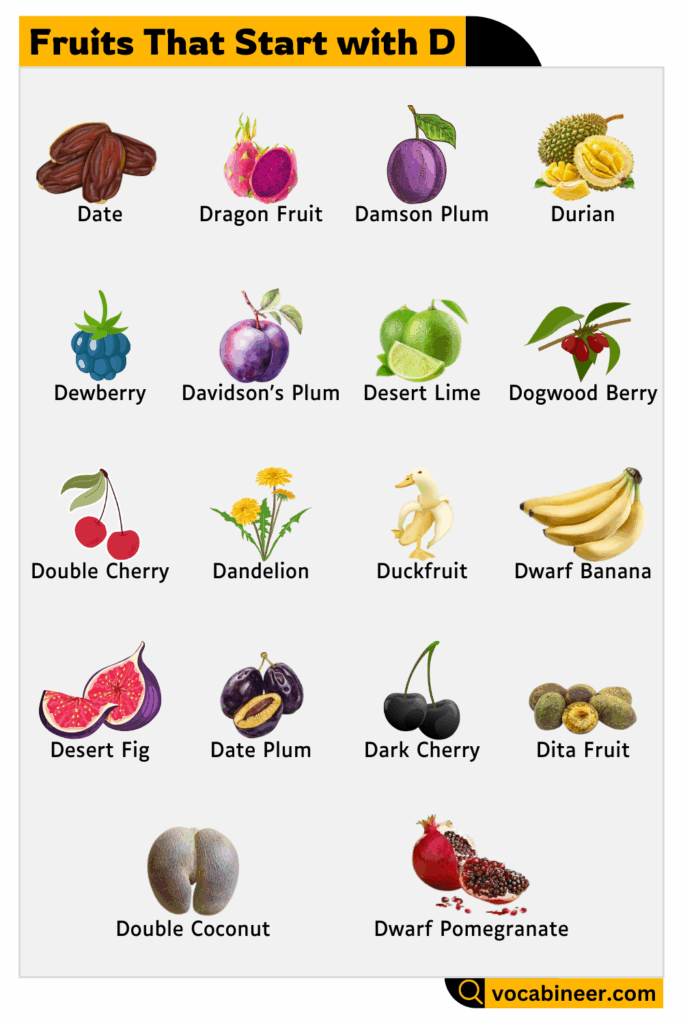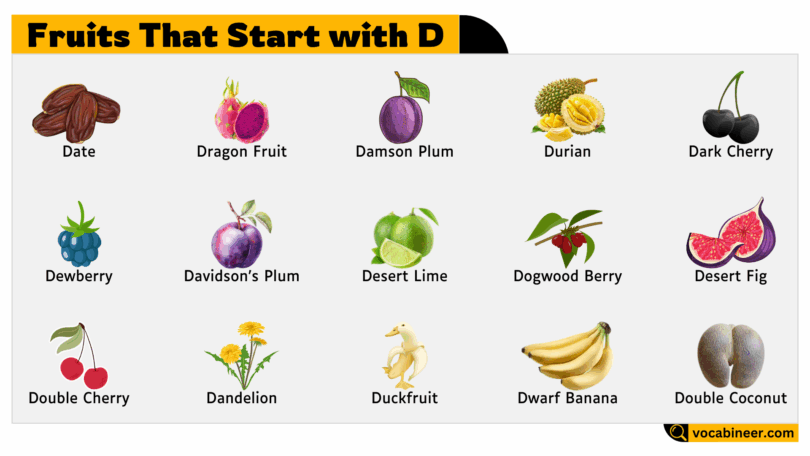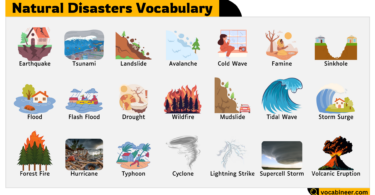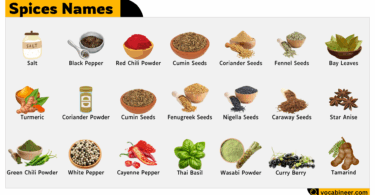25 Fruits That Start with the Letter D are a variety of fruits beginning with “D,” each offering unique tastes and health benefits. Learning these fruits helps expand your vocabulary and understanding of nutrition. From the sweet date to the colorful dragon fruit, mastering these names will improve both your language skills and knowledge of healthy foods, making it easier to incorporate them into everyday conversations.
In This Page
Fruits Starting with D in English with Pictures

List of Fruits That Start with D
- Date
- Dragon fruit
- Damson
- Desert lime
- Dewberry
- Davidson’s plum
- Desert fig
- Duku
- Dodanthera fruit
- Double coconut
- Dangleberry
- Desert banana
- Desert quandong
- Desert peach
- Dwarf banana
- Dwarf mulberry
- Desert guava
- Dwarf pomegranate
- Desert orange
- Darjeeling banana
- Dwarf cherry
- Dwarf papaya
- Desert lemon
- Desert grape
- Dwarf apricot
- Desert apple
- Desert raisin
- Desert plum
- Desert berry
- Dwarf citrus
- Dryland date
- Dried fig (as a variant)
- Desert cranberry
- Desert walnut fruit
- Desert tangerine
- Drumstick fruit
- Dwarf loquat
- Dwarf nectarine
- Dutch medlar
- Dwarf jackfruit
25 Common Fruits Starting from D
- Date
Sweet, chewy fruit from the date palm tree. High in natural sugar and fiber, often eaten dried. - Dragon Fruit
Vibrant pink or yellow fruit with white or red flesh and black seeds. Mildly sweet and rich in antioxidants. - Damson
A small, dark purple plum known for its tart flavor. Commonly used in jams and desserts. - Dewberry
Berry similar to a blackberry, growing close to the ground. Juicy and slightly sweet. - Desert Lime
Small, tangy citrus native to Australia. Used in sauces, marmalades, and chutneys. - Davidson’s Plum
Sour, dark-purple fruit from Australia. Rich in antioxidants and vitamin E. - Darwin’s Barberry
Tiny, orange-red berries from South America. Tart and used in preserves and jellies. - Double Coconut
Largest seed in the world, native to Seychelles. Rarely eaten but notable for its massive size. - Desert Banana (Bush Banana)
Australian bush fruit, not a true banana. Eaten raw or cooked; slightly bitter taste. - Dabai (Sarawak Olive)
Glossy black fruit from Borneo with buttery flesh. Boiled and eaten with salt or soy sauce. - Desert Fig
Native to arid regions. Small, dry fig-like fruit used in indigenous diets. - Desert Quandong
Bright red, tart Australian fruit used in jams and chutneys. High in vitamin C. - Desert Raisin (Bush Tomato)
Small, dried wild tomato with intense flavor. Native to Australia. - Duku
Sweet tropical fruit similar to langsat. Grows in Southeast Asia and eaten fresh. - Desert King Fig
Large green-skinned fig with pink flesh. Grown in hot climates and very sweet. - Dangleberry
Wild blue-purple berry similar to a huckleberry. Grows in North America. - Dwarf Mulberry
Compact tree variety with sweet, red-to-black berries. Eaten fresh or dried. - Desert Pear
Hybrid fruit with the flavor of pear and cactus fruit. Used in juices and syrups. - Dwarf Banana
Small banana plant that grows compact fruit. Sweet and commonly found in home gardens. - Dwarf Cherry
Tiny cherry variety from small trees. Sweet and ornamental. - Dwarf Pomegranate
Miniature pomegranate mostly grown for decoration, but fruit is edible though small. - Dovyalis
Also called Ceylon gooseberry, it’s tart and juicy. Found in Africa and South Asia. - Dwarf Apple
Small apple trees producing full-sized fruit. Perfect for small gardens. - Desert Apple
Wild apple from arid regions, smaller and more tart than cultivated apples. - Dwarf Orange
Small citrus tree that bears mini but sweet oranges. Grown for ornamental and edible purposes.
Read More






